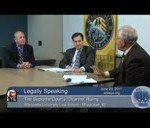As we are all aware, these past couple of weeks have been a time of historic change for the state of Wisconsin. The debate surrounding the changes proposed by Governor Walker in the Budget Repair Bill has been amazing for me to witness. Rather than give my personal opinions regarding the content of the bill, I thought I would share of the ancillary thoughts that have run through my head because of the current political times.
First, these changes have occurred during a great time in my life. I consider myself lucky to be able to observe such historic legislative action while enrolled here at Marquette. We as law students are unique within the political discussion because we have access to such great legal minds. For example, two weeks ago Professor Paul Secunda spoke to students about the then-proposed Budget Repair Bill. Professor Secunda reserved time to answer very well thought-out and informed student questions regarding things like: the potential legal avenues of those opposed to the bill, the effect that Wisconsin’s labor reforms could have on a national level, and what specific items within the bill actually mean to citizens and public employees within the state.
The presentation by Professor Secunda is just one of the many opportunities we have as legal scholars to advance our personal knowledge on very important political issues. This Marquette University Faculty Blog has provided a forum for other Professors and local attorneys to provide their opinions and thoughts regarding the reform. These forums provide an outlet for legal thinkers as well as a resource for students like me.
Ultimately, while the bill has been passed (although currently subject to a temporary restraining order) by the Legislature, discussions regarding the changes have only just begun. As a participant in this emotional and heated discussion, I consider myself lucky to have been in law school during these changes.
Second, the changes to public sector labor law have made me think back to some of the statements made by Justice Antonin Scalia during his presentation at Marquette in the fall.
 On June 23, I participated in a discussion concerning the Wisconsin Supreme Court’s decision in Ozanne v. Fitzgerald, 2011 WI 43, on the Wisconsin Eye public affairs show “Legally Speaking.” Rick Esenberg and I continued our ongoing difference of opinion regarding this litigation, which seems to generate an endless supply of novel and contentious legal questions. You can view the program at this link.
On June 23, I participated in a discussion concerning the Wisconsin Supreme Court’s decision in Ozanne v. Fitzgerald, 2011 WI 43, on the Wisconsin Eye public affairs show “Legally Speaking.” Rick Esenberg and I continued our ongoing difference of opinion regarding this litigation, which seems to generate an endless supply of novel and contentious legal questions. You can view the program at this link.